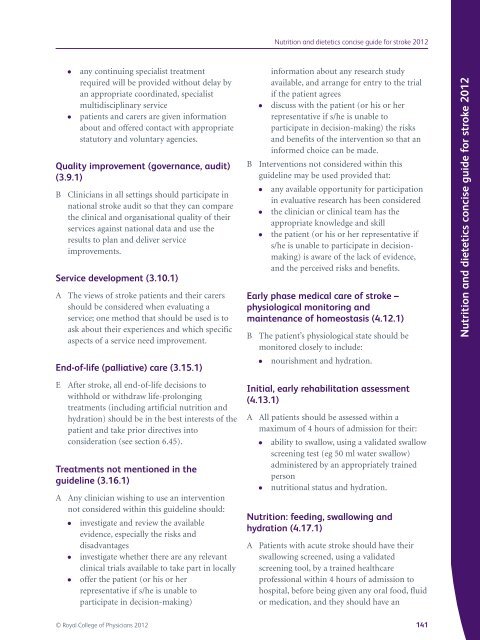national-clinical-guidelines-for-stroke-fourth-edition
national-clinical-guidelines-for-stroke-fourth-edition
national-clinical-guidelines-for-stroke-fourth-edition
You also want an ePaper? Increase the reach of your titles
YUMPU automatically turns print PDFs into web optimized ePapers that Google loves.
● any continuing specialist treatment<br />
required will be provided without delay by<br />
an appropriate coordinated, specialist<br />
multidisciplinary service<br />
● patients and carers are given in<strong>for</strong>mation<br />
about and offered contact with appropriate<br />
statutory and voluntary agencies.<br />
Quality improvement (governance, audit)<br />
(3.9.1)<br />
B Clinicians in all settings should participate in<br />
<strong>national</strong> <strong>stroke</strong> audit so that they can compare<br />
the <strong>clinical</strong> and organisational quality of their<br />
services against <strong>national</strong> data and use the<br />
results to plan and deliver service<br />
improvements.<br />
Service development (3.10.1)<br />
A The views of <strong>stroke</strong> patients and their carers<br />
should be considered when evaluating a<br />
service; one method that should be used is to<br />
ask about their experiences and which specific<br />
aspects of a service need improvement.<br />
End-of-life (palliative) care (3.15.1)<br />
E After <strong>stroke</strong>, all end-of-life decisions to<br />
withhold or withdraw life-prolonging<br />
treatments (including artificial nutrition and<br />
hydration) should be in the best interests of the<br />
patient and take prior directives into<br />
consideration (see section 6.45).<br />
Treatments not mentioned in the<br />
guideline (3.16.1)<br />
A Any clinician wishing to use an intervention<br />
not considered within this guideline should:<br />
● investigate and review the available<br />
evidence, especially the risks and<br />
disadvantages<br />
● investigate whether there are any relevant<br />
<strong>clinical</strong> trials available to take part in locally<br />
● offer the patient (or his or her<br />
representative if s/he is unable to<br />
participate in decision-making)<br />
Nutrition and dietetics concise guide <strong>for</strong> <strong>stroke</strong> 2012<br />
in<strong>for</strong>mation about any research study<br />
available, and arrange <strong>for</strong> entry to the trial<br />
if the patient agrees<br />
● discuss with the patient (or his or her<br />
representative if s/he is unable to<br />
participate in decision-making) the risks<br />
and benefits of the intervention so that an<br />
in<strong>for</strong>med choice can be made.<br />
B Interventions not considered within this<br />
guideline may be used provided that:<br />
● any available opportunity <strong>for</strong> participation<br />
in evaluative research has been considered<br />
● the clinician or <strong>clinical</strong> team has the<br />
appropriate knowledge and skill<br />
● the patient (or his or her representative if<br />
s/he is unable to participate in decisionmaking)<br />
is aware of the lack of evidence,<br />
and the perceived risks and benefits.<br />
Early phase medical care of <strong>stroke</strong> –<br />
physiological monitoring and<br />
maintenance of homeostasis (4.12.1)<br />
B The patient’s physiological state should be<br />
monitored closely to include:<br />
● nourishment and hydration.<br />
Initial, early rehabilitation assessment<br />
(4.13.1)<br />
A All patients should be assessed within a<br />
maximum of 4 hours of admission <strong>for</strong> their:<br />
● ability to swallow, using a validated swallow<br />
screening test (eg 50 ml water swallow)<br />
administered by an appropriately trained<br />
person<br />
● nutritional status and hydration.<br />
Nutrition: feeding, swallowing and<br />
hydration (4.17.1)<br />
A Patients with acute <strong>stroke</strong> should have their<br />
swallowing screened, using a validated<br />
screening tool, by a trained healthcare<br />
professional within 4 hours of admission to<br />
hospital, be<strong>for</strong>e being given any oral food, fluid<br />
or medication, and they should have an<br />
© Royal College of Physicians 2012 141<br />
Nutrition and dietetics concise guide <strong>for</strong> <strong>stroke</strong> 2012


